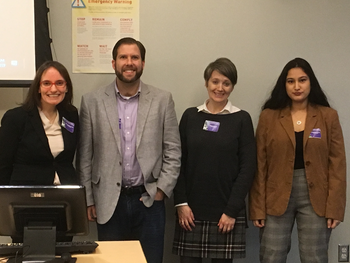
“When I saw that UNC Chapel Hill and Duke were hosting the first annual North Carolina Latin American Studies conference,” says Spanish professor Diana Lee, “it made sense to organize a panel with [History professor Chris Woolley and Political Science professor Melissa Buice] because our research interests all intersect in many ways, particularly around the care of the environment in Latin America.” Lee recognized that UNCP faculty’s expertise reached across traditional departmental boundaries and that making interdisciplinary connections would strengthen each of their research agendas.
Woolley agreed. “The paper I gave [at the conference] was on the politics of forest access under the Aztec Empire,” he explained. “It is part of the first chapter of a book I’m writing on the history of Mexico forests from pre-Hispanic times to independence in 1821. As such, it’s a necessarily interdisciplinary study, so it’s always great to get to talk about my work with colleagues from other departments, especially since they often have theoretical frameworks that are new to me that I can shamelessly borrow.”
But Lee, Woolley, and Buice did more than develop their own ideas: they asked an undergraduate student, Spanish major Dominique Perez, to join their panel. “She is an incredibly intellectually curious undergrad and she was discussing this issue of fracking that was occurring in her parents’ home region in San Luis Potosí, Mexico,” reported Lee. “So, I asked her to join our panel to discuss the indigenous resistance to fracking in that area.”
Lee added that working with Perez made it clear that interdisciplinary work benefits undergraduate researchers as well as their mentors: “As I was working with Dominique to develop the broad stroke ideas for her paper[,] I was able to consult with [Wooley] and [Buice] since my own literary background wasn’t going to be an appropriate approach for her research. I learned a lot from the experience about how different fields discuss the issue of environmental care, and it was great to hear from each of my colleagues and Dominique.”
Perez added that the opportunity offered her new ways to understand both her own experiences and academics: “Attending this conference helped me voice personal experiences through an academic outlet. It required me to do research on a topic I would've otherwise been less informed about. I believe academic reasoning is strategic, informative and self-educating which are all aspects I value.”
Buice suggested that the faculty learned as much from Perez. “Dominique’s presentation was thoroughly inter-disciplinary and important from the perspective of providing in-depth contextual analysis of environmental politics in Mexico. Her own words and experiences—revealing clarity of vision in the project-- were some of the most relevant and revealing of the whole panel,” Buice said.
Perez also appreciated the opportunity for development this experience allowed her. “Presenting my research allowed me to gauge my public speaking abilities, and opened my eyes to areas that need improvement. Overall the experience was an opportunity for growth.” Wooley adds that she’s already off to a good start: “I remember giving my first papers years ago when I was in college, and I will say she was certainly much better prepared than I had been. I think introducing students to our profession is an important opportunity that is often ignored.”
All four panelists agreed that they both got a lot out of the experience and had great hopes for future possibilities. “Collaborating with other regional specialists has always been an important part of the research all political scientists do on Latin American indigenous social movements,” Buice noted, “so I was excited to present alongside the history and Spanish departments and take advantage of their expertise in their relative fields. Interacting with the scholars about their research deepened my understanding of the region and its approach to environmental issues, something that is important for producing better research in the future.” Lee agreed, adding that the interdisciplinary collaboration is far from over: she looks forward to more opportunities to “discuss current issues in Latin America and how we can use our knowledge together to incorporate these topics into our respective teaching.”